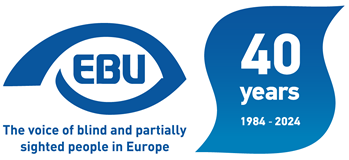On 27th and 28th June 2016 Barrier-free city for all, a working group of Eurocities, held its 14th meeting in Prague, this time focused on accessibility of visually impaired people.
The agenda was tight and following three topics were given a prominence: the Czech System of Environment Adaptations, European Accessibility Act (EAA) and Shared Spaces.
Discussion on EAA was somewhat technical and finances oriented. The biggest issue Eurocities are now having with the EAA is that EU may prescribe the cities to become accessible, but may not force the national governments to cover the related expenses. Eurocities also interpret current wording of EAA in a way that means all cities would have to become fully accessible within 6 years from entry into force. Such a request is perceived as absolutely unrealistic.
An interesting discussion on Shared Spaces was raised by Barcelona. Every city seems to use a different approach and even the results are different, including the overall level of satisfaction. Speed limits range from 10 to 30 km/h and the type of vehicles allowed to enter also varies significantly. The Portuguese representative made an interesting observation that introducing tactile or any other features on shared spaces only creates a feeling of safety, but as the safety does not actually increase, it in fact decreases as the person wrongly believes he or she is safer. The trouble is that most users tend to believe the space is theirs and do not respect it as a shared space, be it a car driver, pedestrian, impaired person or anyone else.
The whole first day of the meeting was dedicated to the Czech System of Environment Adaptations, which is perceived by some experts as the best system in the world. The Czech Blind United (SONS) gave a 90 minute presentation providing an overview of various visual impairments, assistive aids and technologies and explained the Czech national system of adaptations, including usage of the so-called Transmitter for the Blind. The presentation focused considerably on best practices as well as on threats and was immediately followed by a “sightseeing tour of Prague adaptations”, a 2 hour on-site demonstration of many of the features described within the presentation, many of which are activated by the Transmitter for the Blind.
Both the presentation and the tour were a great success; SONS got very positive feedback and dozens of requests for cooperation. The presentation was especially praised as being informative without going too much into technical details. For this reason SONS has made available not only the presentation itself, but also a full speech transcript, and description of the tour with photos of each adaptation and many other supportive materials, all of which are fully accessible. You may download them from
https://www.sons.cz/Barrier-Free-Cities-2016-P4003518.html
Meeting minutes and all other presentations may be downloaded here.
For further details please contact Jan Urbánek (urbanek@sons.cz)

